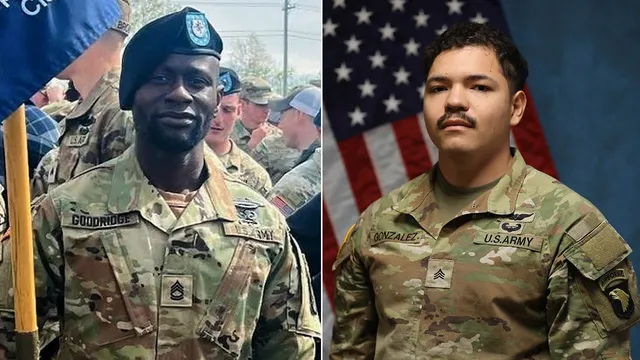
Two U.S. soldiers die in non-combat incidents in Iraq and Kuwait
2025-06-19 11:06- Two U.S. soldiers died in separate non-combat incidents while supporting Operation Inherent Resolve.
- Staff Sgt. Saul Fabian Gonzalez passed away in Erbil, Iraq, while Sgt. 1st Class Emmett Wilfred Goodridge Jr. died in Kuwait.
- Both incidents are under investigation by the Department of Defense.
Express your sentiment!
Insights
In a tragic occurrence, two U.S. soldiers lost their lives in separate non-combat incidents while stationed in the Middle East as part of Operation Inherent Resolve. The first soldier, Sgt. 1st Class Emmett Wilfred Goodridge Jr., was reported dead following an incident at Camp Buehring, Kuwait, on June 16, 2025. He was a member of the 2nd Battalion, 22nd Infantry Regiment, and was stationed at Fort Drum, New York. His death is under investigation by the Department of Defense. Three days later, on June 19, 2025, Staff Sgt. Saul Fabian Gonzalez, an Apache helicopter mechanic, was confirmed deceased in Erbil, Iraq. At just 26 years old, Gonzalez was a dedicated member of the 101st Combat Aviation Brigade, based at Fort Campbell, Kentucky. He had joined the Army in February 2018 and rose through the ranks to become a Non-Commissioned Officer, earning several accolades for his service, which included an Army Commendation Medal and an Army Aviation Badge. His unit expressed their condolences, mourning the loss of Gonzalez as a well-respected leader and friend. Officials from the Department of Defense are currently investigating both incidents, though no details have been provided thus far. These unfortunate occurrences highlight the risks that soldiers face, even in non-combat situations, as they fulfill their duties in support of military operations against ISIS. Following the deaths, many have expressed their grief and shock on social media, reflecting on the significant contributions made by both soldiers during their service. The losses come shortly after the U.S. Army celebrated its 250th anniversary, a reminder of the ongoing sacrifices made by service members. As these investigations continue, families, friends, and comrades of Staff Sgt. Gonzalez and Sgt. 1st Class Goodridge are left to remember their legacies and to honor the memory of those who serve their country under dangerous conditions, regardless of whether they are in combat zones or not.
Contexts
The safety of Army soldiers in non-combat situations is a critical aspect of military operations that often goes overlooked. While combat scenarios inherently involve a significant level of risk, it is crucial to recognize that soldiers are also vulnerable when engaged in training exercises, humanitarian missions, and other non-combat activities. Implementing effective safety measures is essential to protect these personnel from potential hazards that can arise in various environments. The Army's comprehensive approach to safety includes risk assessment protocols, preventive measures, and continuous training to ensure that soldiers are prepared for any situation outside of direct combat. Risk assessment is the foundation of the Army's safety measures. Before soldiers engage in any non-combat operation, a thorough evaluation of potential hazards is conducted. This includes analyzing environmental factors, identifying possible threats, and assessing the capabilities of soldiers in specific situations. By understanding the risks involved, military leadership can develop tailored strategies to mitigate these risks, ensuring that soldiers remain safe while fulfilling their duties. This proactive approach not only helps to safeguard the well-being of soldiers but also enhances operational effectiveness by minimizing disruptions that could arise from accidents or safety violations. Preventive measures play a vital role in safeguarding soldiers during non-combat situations. The Army enforces strict safety regulations that govern conduct during training exercises and other operations. Soldiers are required to wear appropriate personal protective equipment (PPE) and follow standardized protocols to minimize exposure to hazards. In addition, regular safety briefings and drills are conducted to reinforce best practices and ensure that all personnel are aware of the safety procedures in place. This culture of safety promotes accountability among soldiers and encourages a shared commitment to maintaining a safe environment. Continuous training is essential for the implementation of safety measures. The Army prioritizes regular training sessions that focus on safety protocols, emergency response procedures, and risk management. By simulating various non-combat scenarios, soldiers are equipped with the necessary skills to respond effectively to unexpected situations. This ongoing education not only enhances individual competencies but also fosters teamwork and communication, which are vital in ensuring collective safety. Ultimately, the combination of risk assessment, preventive measures, and continuous training establishes a robust framework for protecting Army soldiers during non-combat situations, thereby contributing to their overall mission readiness and well-being.